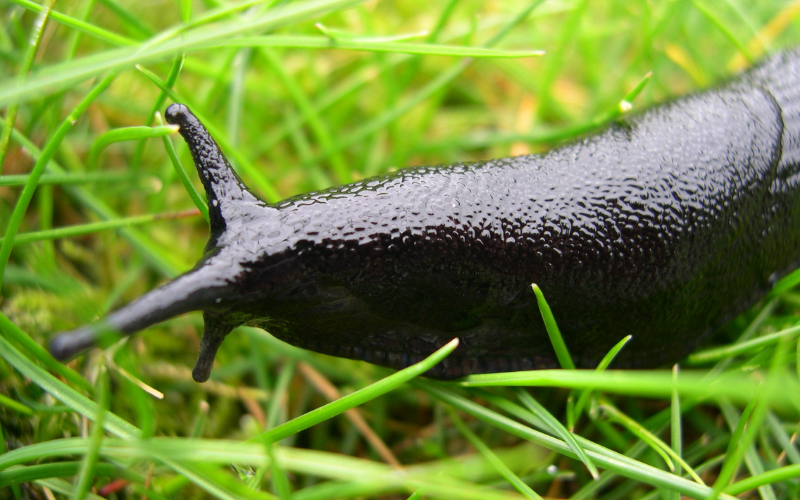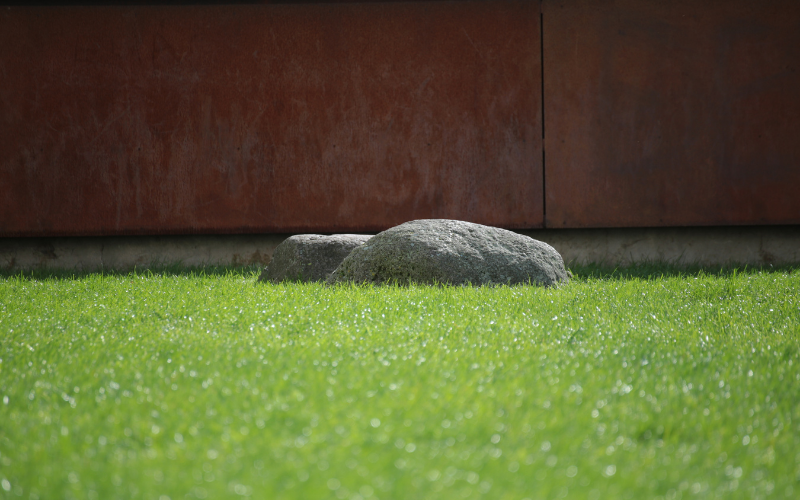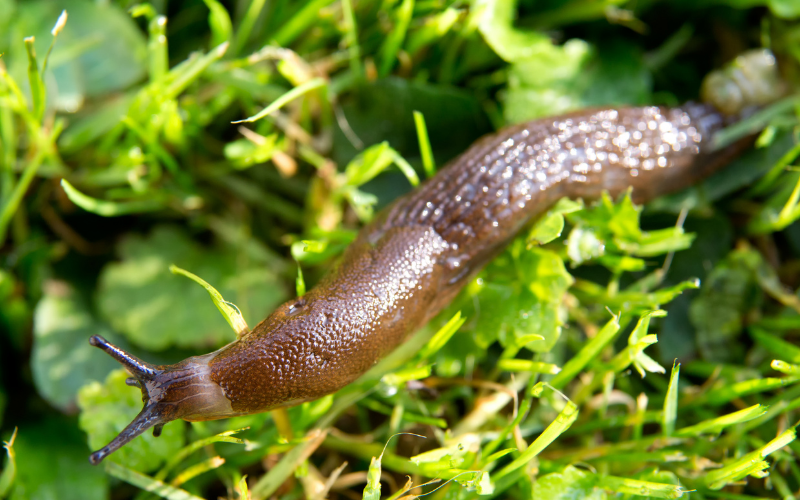If you have a slug problem, don’t wait to act. The longer you wait, the more slugs that will move into the area.
You can use a combined effort of natural, organic methods to eliminate slugs and chemicals that act fast and help eliminate the problem for good.
Slugs aren’t insects; however, they can still be huge pests for any homeowner. These small, slimy creatures can infest your lawn and garden and become so pervasive that you don’t even want to venture outdoors at night.
While slugs can be a problem, there are steps you can take to get rid of them. Keep reading to learn more about how to handle a slug infestation on your lawn.

Signs of a Slug Infestation
Before figuring out how to handle a slug infestation on your lawn, it’s important to make sure this is the issue you are dealing with.
Some of the most common indications of a slug problem include:
- Ragged holes on leaves
- Untouched stems
- Silvery, slime on chewed leaves
- Slime trails on rocks, wood, and pavement
- Scalloped bite pattern on leaves
- Overnight damage to plants
It’s worth noting that heavy slug damage typically occurs right after heavy rain and in the early spring months. Even so, it’s possible you might experience slug problems at any time of the year.
If you want indisputable proof that slugs are the culprit, go outside with a flashlight at night and search for them.
Slugs aren’t shy, which means they will keep on eating even as you watch them.
How to Get Rid of Slugs in Grass
Now that you are sure you are dealing with a slug infestation on your lawn, it’s time to act. The question is – what can you do?
Don’t worry; there are several ways to eliminate slugs and keep them from coming back. Not only will your lawn thank you, but your grass will be healthier once you get rid of the slugs for good.
Get the Right Plants
A gentle and non-violent way to eliminate slugs in your grass is by lining your yard with plants that naturally deter them. By doing this, you can keep slugs away from your grass without using potentially harmful chemicals.
For example, Astrantia has a scent that repels slugs. Some other plants to use that will deter slugs from munching on your grass include rosemary, anise, fennel, rue, and wormwood.
Water Grass in the Morning
Experts agree that watering your lawn in the morning is best. Also, doing this will protect your grass and plants from slugs. That’s because the water will fully evaporate during the day.
Gardens, plants, and grass that remain moist overnight are extremely attractive for slugs. The drier your grass is at night, the more likely slugs will avoid it.
So if you cut your grass in the evening, and find yourself asking “Should I water my lawn after mowing tonight?” the answer is no. Wait until the morning.
Create a Slug “Trap”
You can create an effective “slug trap” if you lay pieces of cardboard or boards on soil or the ground near your grass.
Every morning, flip the boards and scrape all the slugs off into plastic containers.
At this point, you can freeze them for about three hours and after they are frozen, add them to your compost pile.
Remove Sources of Shelter
Slugs want to find cover. This means they will hide under almost anything, including logs, garden furniture, bricks, and more. Take time to remove any “slug shelter” so they are exposed to natural predators.
If you make your lawn a hostile habitat for slugs, their numbers will decline naturally.
Also, encourage the presence of natural predators on your lawn, like song thrushes, hedgehogs, newts, and toads. These creatures will help you handle your slug infestation.

Use Beer
Fill up shallow dishes with beer and place them around your lawn. This will lure the slugs and cause them to die.
Another option is to mix baking yeast, flour, cornmeal, and molasses to replace the beer. Both of these are smart options that can help minimize the slug population on your lawn.
Unfortunately, some slugs may be beer resistant. If this is the case, they are going to crawl out of the dish. When this happens, it’s up to you to create a beer trap they can’t get out of.
You can cut the spout end off a bottle and then turn it around so it is inside the bottle. Fasten it together with tape or stables. Put beer in your bottle and then lay it on its side in the garden.
Once the slug crawls inside, they won’t be able to get out.
Put Down Copper Tape
Copper will react with slug slime and create a tiny electric shock when a slug contacts it.
Lay out self-adhesive copper tape in your lawn to help deter slugs from making a meal in your yard.
You can attach the tape to anything, really, and it is a pretty effective way to keep slugs off your lawn.
Add Nematodes to Your Soil
Nematodes are micro-organisms that live in the soil. They are parasites to slugs. You can mix nematodes with water and then add them to your soil.
For this treatment to be effective, the soil needs to be over five degrees Celsius.
Use Salt
You can sprinkle salt to kill slugs, but use caution. Too much salt is going to harm your grass and plants.
So, this may not be the best way to eliminate slugs from your yard.

Preventing a Slug Infestation on Your Lawn
If you don’t have slugs yet, or if you finally got rid of them, chances are you want to make sure they never appear or that they don’t come back. There are steps you can take to prevent a slug infestation on your lawn.
You should rake your lawn in the early spring months and remove as much of the moist debris that has been left. After all, slugs love this type of foliage.
Raking is also going to eliminate any slug eggs that are hanging around. Also, larger wood chips provide a perfect hiding spot for slugs, so try to avoid using them as much as possible.
Some other steps you can take to prevent a slug infestation include:
- Only water your lawn when needed
- Encourage natural predators to frequent your lawn
- Use organic slug bait
If you are like most homeowners, you want to keep your lawn healthy. Part of this means preventing damage from slugs.
Use the tips and information above to help create a slug-resistant lawn.


Interesting stuff. I thought that after the first rain for weeks and weeks I would be able to scoop up masses of slugs into my jam jars. ( I screw the lid on tight and bin them, horrid I know, but effective.)
I caught lots of snails and only a few very small slugs. I wondered if I got up too late at 7.15.
Any thoughts?
Hi Jane,
Slugs, like snails, do come out after it rains. However, slugs are a little more sensitive to light than snails so you are unlikely to see them on a clear day or after the sun has come up, even if it rained all night. If I’m looking for slugs in the summer, I make sure to be outside just at sunrise or a little before. I’m not sure where you live, but here the sun is rising before 6 am so you may have just missed them.
I hope this helps 🙂